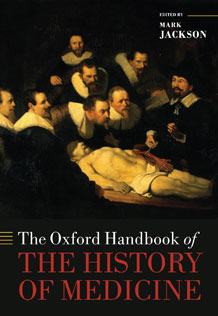
Book cover
Exeter leads the way in the history of medicine
The Oxford Handbook of The History of Medicine is the first large scale review of the field to be published in over twenty years.
This extensive volume, which celebrates the richness and variety of medical history around the world, has been edited by Mark Jackson, Professor of the History of Medicine at the University of Exeter.
The book addresses major themes in the history of medicine, including the histories of childhood and ageing, women and medicine, death, science and medicine, chronic diseases, public health, alternative medicine, medical ethics, and mental illness. Original articles have been written by 37 leading international scholars offering up-to-date discussion of key themes and issues in the field. Unlike previous books, this handbook also looks at different periods of history around the world, providing a global history of medicine, including Islamic, Chinese, Eastern European, Australasian, and South American medical traditions. The handbook seeks to provide a constructive overview of the current state of these debates and to offer new directions for future research.
Professor Jackson said: “The history of medicine can raise important questions about medicine as well as history. For example, one chapter explores different approaches to health care in the modern world, from the NHS to USA private health care, and attempts to evaluate which systems work best and whether it matters how health care is funded. Historical reflection also opens up new debates about how health is politicised, linking historical analysis closely to current debates about how we look after children and the elderly, for example.”
He added, “Most of the contributors have been supported by the Wellcome Trust, which has been the most generous and inventive funder of medical history and humanities. Although they demonstrate a keen engagement with historical methods and ideas, the chapters also echo the Trust’s commitment to improving human and animal health through history and the humanities as well as the sciences. In particular, the Handbook aims to expose the cultural, economic and political contexts of medical knowledge and practice in the past and present.”
The University of Exeter’s Centre for Medical History has been integral to the development of the The Oxford Handbook of The History of Medicine, which has taken over five years to produce. The Centre for Medical History brings together colleagues from different academic disciplines across the humanities in order to make significant advances in the fields of the history of stress, the environment and health, allergies, insanity and institutional care, and fertility and sexual cultures and practices. The Centre has close links with medical and health care professionals in the region and with local schools.
In addition to Mark Jackson, three historians from the Centre, Dr Kate Fisher, Dr Staffan Muller-Wille and Dr Ed Ramsden, have contributed to the handbook.
Dr Kate Fisher, co-Director of the Centre for Medical History has contributed a chapter about uses of oral history by historians of medicine and its challenges and directions for future research. Dr Fisher said: “In recent decades oral history has become a prominent and important method used by historians of medicine. My chapter draws attention to the key trends in the field and key works of broad interest. It also highlights the particular ethical issues facing oral historians of medicine who can find themselves caught between the different ethical conventions governing medical research and those deemed appropriate among oral historians.”
She added “For example, many medical ethical committees require the destruction of interview data once the findings have been disseminated, whereas for oral historians the creation of an archival body of research for future historians is a central goal of the research.”
As a science historian Dr Muller-Wille wrote a chapter about the relationship between the history of science and the history of medicine and regards the publication as an extremely important tool. Dr Muller-Wille said: “Oxford Handbooks are a key resource for researchers, lecturers and students. Writing a chapter for the Oxford Handbook of the History of Medicine offers an excellent opportunity for a historian of science to reach a wide audience in a neighbouring discipline. This can result in fruitful collaborations at the intersection of the history of science and medicine.”
Date: 6 September 2011
